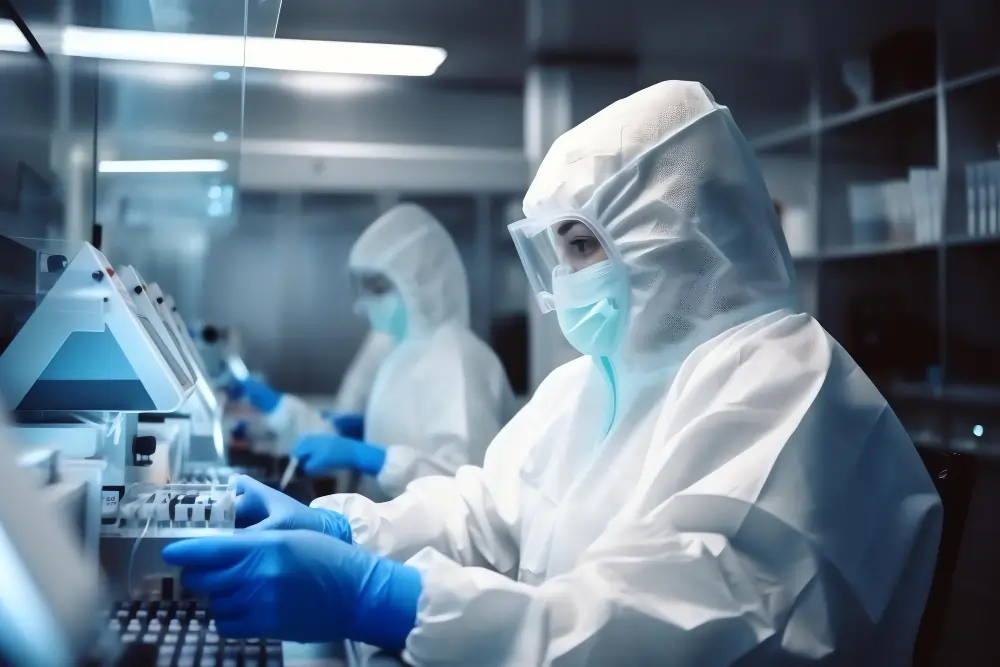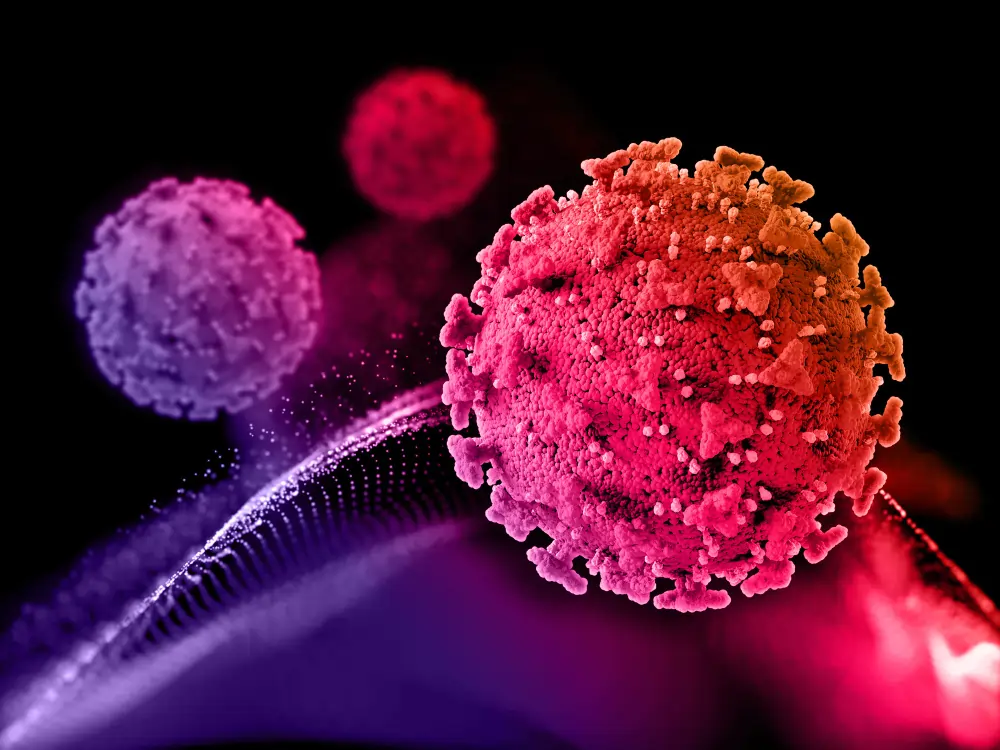
Introduction
Cancer treatment has come a long way in recent years, with immunotherapy emerging as a promising avenue for fighting the disease. Antibodies play a crucial role in this process by targeting cancer cells and activating the body’s immune response. However, traditional methods of antibody production face numerous challenges, hindering their widespread use. In this article, we will explore the groundbreaking innovation that the Indian Institute of Science (IISC) has introduced – synthetic antigens. Researchers at the Indian Institute of Science (IISc) have designed a synthetic compound (antigen) that can latch on to a protein in the blood and hitchhike a ride to the lymph node, where it can boost the production of antibodies against cancer cells.
The innovation: IISC’s synthetic antigens
What are synthetic antigens?
Synthetic antigens are artificially created molecules that mimic the structure of specific proteins found on the surface of cancer cells. These molecules trigger an immune response, leading to the production of antibodies targeting cancer cells. IISC has pioneered the development of these synthetic antigens, opening new doors for cancer treatment.
How IISC’s synthetic antigens revolutionize antibody production
Inside the human body, cancer cells can weaken or shut down the production of antibodies that target and eliminate them. Developing a cancer vaccine, therefore, involves modifying or creating a mimic of an antigen found on the surface of cancer cells to turn up or turn on this antibody production.
IISC’s synthetic antigens offer several significant advantages over traditional methods of antibody production. Firstly, they provide a more precise and targeted approach as synthetic antigens can be designed to match specific cancer cell proteins. This specificity enhances antibody effectiveness and reduces the chances of off-target effects. Additionally, synthetic antigens are not limited by the availability of cancer cells, allowing antibody production even when cancer samples are scarce.
Advantages of using synthetic antigens
“Carbohydrate-based antigens have enormous importance and relevance in cancer vaccine development,” explains N Jayaraman, Professor at the Department of Organic Chemistry and senior author. Using synthetic antigens has several advantages in antibody production for cancer treatment. Firstly, the sheer diversity of possible synthetic antigens offers a broader range of targets, allowing for increased precision in antibody therapies. Moreover, synthetic antigens have a higher stability and reproducibility compared to traditional antigens. This stability ensures consistent antibody production and reduces variations in treatment outcomes. Furthermore, the scalability and cost-effectiveness of synthetic antigen production make it a highly viable option for large-scale antibody manufacturing.
The science behind IISC’s synthetic antigens
Understanding the immune system’s response
To appreciate the significance of synthetic antigens, we need to delve into how the immune system responds to foreign molecules. When the body detects non-self antigens, such as those present in cancer cells, the immune system triggers an immune response. This response involves the production of antibodies that specifically recognize and neutralize the antigens, facilitating the elimination of cancer cells.
How synthetic antigens trigger an immune response
IISC’s synthetic antigens are designed to mimic the structure of the antigens present in cancer cells. By introducing these synthetic antigens into the body, they effectively trick the immune system into recognizing them as foreign and initiating an immune response. This response results in the production of antibodies, specifically tailored to target the cancer cells.
Overcoming limitations of traditional antigen production
Traditional antigen production methods rely on extracting cancer cells or proteins from them. However, this approach poses limitations regarding the availability and variability of cancer samples. Moreover, the extraction process might alter the characteristics of the antigens, affecting their effectiveness. IISC’s synthetic antigens overcome these limitations by providing a controlled and highly reproducible method of antigen production, ensuring consistent and effective antibody response.
The process of synthetic antigen production by IISC
Designing synthetic antigens
IISC utilizes cutting-edge technology and bioinformatics tools to design synthetic antigens. By analyzing the protein structure of cancer cells and identifying specific antigenic epitopes, they can create synthetic molecules that closely resemble the target antigens. This precision in antigen design enhances the specificity and effectiveness of the resulting antibodies.
Optimizing the immune response
The success of antibody production depends on the immune system’s response to synthetic antigens. IISC employs various strategies to optimize immune responses, such as incorporating adjuvants to enhance the immune reaction, modulating dosage, and timing of antigen administration, and employing immunostimulatory compounds. These measures ensure robust and efficient production of antibodies against cancer cells.
Manufacturing scalability and cost-effectiveness
One of the critical considerations in developing synthetic antigens is their scalability. IISC has developed a streamlined manufacturing process that allows for large-scale production of high-quality synthetic antigens. The synthesis methods used are cost-effective and ensure that the produced antigens maintain their structural integrity and functionality. This manufacturing scalability enables broader accessibility to antibody treatments for cancer patients.
The impact on cancer treatment

Enhanced antibody specificity and effectiveness
The utilization of synthetic antigens results in the production of highly specific antibodies that target cancer cells with precision. These antibodies can recognize and bind to cancer cell proteins more effectively, leading to enhanced elimination of cancer cells. The improved specificity reduces the likelihood of off-target interactions, minimizing potential side effects of the treatment.
Personalized treatment options
Synthetic antigens lend themselves to personalized medicine approaches. By tailoring the synthetic antigens to match the specific characteristics of an individual’s cancer cells, treatment outcomes can be optimized. This personalized approach ensures that antibody therapies are highly effective against the patient’s particular cancer variant.
Potential for targeted therapies
The development of synthetic antigens opens up new opportunities for targeted therapies. Synthetic antigens can be designed to target specific markers or mutations present in cancer cells, allowing researchers to attack cancer cells with a precision that was previously unattainable. Targeted therapies hold immense promise for more effective cancer treatment, with reduced side effects for patients.
Future prospects and advancements
Utilizing synthetic antigens for other diseases
The breakthrough of synthetic antigens extends beyond cancer treatment. The use of synthetic antigens can be expanded to other diseases with similar immunotherapy potential. By designing synthetic antigens that mimic the antigens present in infectious pathogens or autoimmune disorders, it may be possible to develop effective antibody therapies for a range of diseases.
Combination therapy possibilities
Combining synthetic antigens with other treatments, such as chemotherapy or radiotherapy, holds the potential for synergistic effects. The precise targeting of cancer cells by synthetic antigens, alongside traditional treatments, can enhance their effectiveness and improve overall patient outcomes. The possibilities for combination therapy are vast and represent an exciting avenue for future research.
Continual research and development
With the success of synthetic antigens, further research and development are necessary to refine and expand this innovative approach. Ongoing studies aim to optimize the design of synthetic antigens, improve immune response modulation techniques, and explore the integration of synthetic antigens with emerging therapeutics. Continued efforts in research and development will propel the field forward, leading to even more effective antibody production methods for cancer treatment.
Conclusion
IISC’s groundbreaking innovation of synthetic antigens revolutionizes the field of antibody production for cancer treatment. By leveraging the power of synthetic molecules that mimic cancer cell antigens, IISC provides a precise, scalable, and cost-effective method for producing highly effective antibodies. The impact of synthetic antigens extends to enhanced antibody specificity and effectiveness, personalized treatment options, and the potential for targeted therapies. Looking ahead, the utilization of synthetic antigens in other diseases and in combination therapies opens up new possibilities for advancing the field and improving patient outcomes.
FAQs
1. Are synthetic antigens only useful for cancer treatment?
No, while synthetic antigens have shown great potential in cancer treatment, they can also be used for other diseases. By designing synthetic antigens to mimic antigens present in infectious pathogens or autoimmune disorders, effective antibody therapies can be developed for a range of illnesses.
2. Will synthetic antigens replace traditional methods of antibody production?
While synthetic antigens offer numerous advantages, they are not intended to replace traditional methods entirely. Traditional methods still have their place, particularly in circumstances where specific synthetic antigens might not be available or required.
3. Can synthetic antigens cause any side effects?
Like any medical treatment, synthetic antigens may have potential side effects. However, their highly targeted nature reduces the likelihood of side effects compared to less specific treatments. Ongoing research aims to minimize any potential risks associated with synthetic antigens.
4. How long does it take to develop synthetic antigens for personalized treatment?
Developing synthetic antigens for personalized treatment typically involves a comprehensive analysis of an individual’s cancer cells. This process can take several weeks or months, depending on the complexity of the cancer and the required antigen design.
5. Are synthetic antigens affordable for everyone?
The cost-effectiveness of synthetic antigens is a crucial factor in their development. Efforts are being made to optimize the manufacturing process and reduce production costs, making antibody therapies using synthetic antigens more accessible to a broader range of patients.


